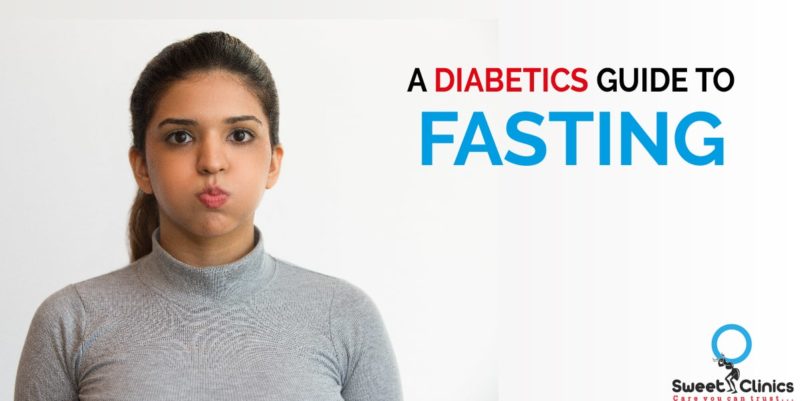
For Diabetics, managing diet in normal day-to-day life is no child’s play; add to that the twist of fasting is an even very risky affair. Diabetics in general are advised not to do fasting. However, if you still want to venture into fasting there are some important precautions & guideline which diabetics need to follow. As we have highlight in this article. First, we talk about who absolutely cannot do fasting & who can. Followed by the right way to plan fasting with the help of your diabetologist and finally what a diabetic should eat and when. So, let’s get started
Diabetics who should absolutely and Definitely NOT do Fasting
- Diabetic people who are on insulin treatment should not even think about fasting as they need constant monitoring and any drop or increase in blood sugar can prove fatal.
- Type 1 diabetics who are inherently dependent on insulin should not fast, sorry but its for your own good.
- Diabetics who have other medical conditions like cardiac, renal problems need to avoid fasting aswell.
- Diabetics who are at a risk or prone to both hypo & hyper glycemia should not do fasting.
- Senior Citizens who are diabetic are advised not to.
Diabetics who can do fasting under the observation of a diabetologist:
Diabetics who fall in the following category of patients can think of fasting but only if their diabetologist clears them to do so:
- Diabetics who have good control on their blood sugar and are not on any high dose of medication can opt for fasting.
- Diabetics who do not have much fluctuations in their sugar levels can think of fasting.
- Diabetics who are not at a high risk of hypo-glycemia can fast.
How to go about fasting if you are diabetic:
- Consult your Diabetologist & get your medications in order: As there will be a change in the food intake there will be a significant change in the blood sugar levels compared to your normal routine. Hence, the dosage of diabetes medications needs to change according. For example, your main medication needs to be shifted according to the time when you will have the proper fasting meal of the day (details below). This change can only be prescribed by your treating diabetologist.
- Monitor your Blood Sugar Religiously; Diabetics should check their blood sugar at-least 3 times a day or whenever they feel symptoms of hypoglycaemia. Signs of hypoglycaemia include feeling weak and giddy, having palpitations. If they find that the blood sugar is below 80 you need to break your fast and have something to eat ASAP! Like a fresh fruit juice!
Managing Diet when fasting if you are diabetic:
The critical challenge for diabetics when fasting is to make sure they don’t go into hypoglycaemia nor should they suffer from hyperglycaemia. For example, Some fasting foods like sabudana (Tapioca) which has a higher glycaemic index if taken in excess can trigger hyperglycaemia While not eating anything for more than 2-3 hours can cause hypoglycaemia. Hence, as suggested earlier its critical to check your blood sugars actively when fasting.
So What should a typical fasting diet include during Navratri;
Diabetics cannot do the fasting where no food or water is allowed during day, please don’t. Fortunately fasting in Navratri allows most of us to have fruits and some sattvic foods during the course of the day. it is important to select foods which have a lower glycaemic index for the reason stated above. Nonetheless you can have other foods with higher glycaemic index in moderation aswell so lets dig in
- Foreword: Diabetics must make sure that they have something every 2 hours to keep their sugar level maintained. Having Mid-meals like Fresh fruit, Milkshake, Chaas, Shikanji, kheer, Shakarkandi ki chaat or Sabudana wada with dahi can be a good option. Keep the portions balanced depending on your physical activity.
Stay Hydrated: Diabetics should have atleast 3 litres of water in a day.
Avoid Caffeine – Tea Cofee – Tea can often cause acidity leading to vomiting and other complications.
- Just after waking up– Early morning are critical as the blood sugars in general are low so diabetics need to make up for it else can go into hypoglycaemia. Start the day by having either of these.
- Any Fresh fruit that you like or may have
- Handful of nuts
- Overnight soaked almonds with kesar
- Breakfast– This meal should ideally help your regain your blood sugar levels and also keep you going for the day hence something like
- Singhare ke pakode
- Sabudana khichdi
- Sweet potato with dahi
- Alu Ki kheer
- Chana poori and halwa (Yes but on last day! With some moderation)
- Lunch – For lunch you can have.
- Rajgira or kuttu or singhare atta ki roti with Alu or arbi sabzi
- Makhane ki sabzi
- Kuttu ki kadhi with samo chawal
- upasacha thalipeeth
- Dinner – For fasting diabetics, skipping dinner is not an option. Dinner needs to keep your sugars up all night so you the diabetic can stills stand in the morning. A proper fasting meal would be ideal or you could try
- Samo chawal with dahi
- Jhangora kheer
- Paneer ki sabzi with kuttu or singhare or rajgira or banana flour ki roti
So have a happy & safe fasting! and remember If you are unsure of how to go about this you can contact your treating diabetologist or contact us 9167444888 on and our inhouse diabetologist & Diet consultant will guide you.
This Articel has been written by our Diabetologist Dr. Vinod Methil & Diet Consultant Prateeksha Kadam.
